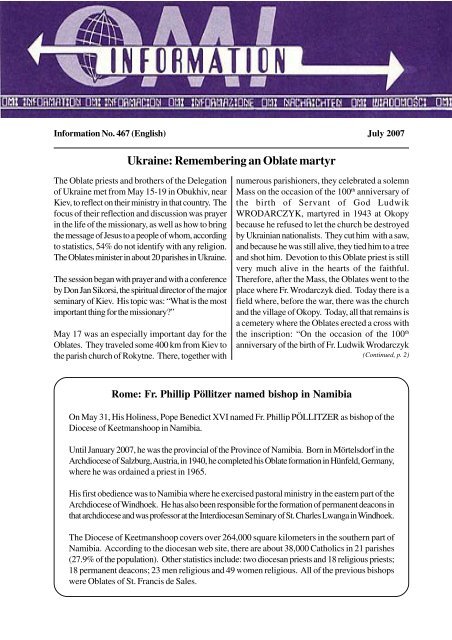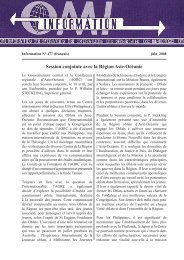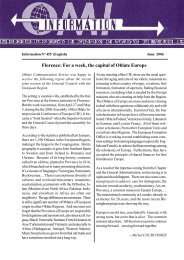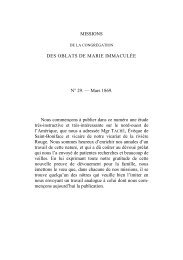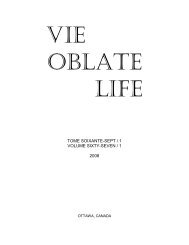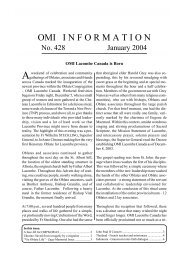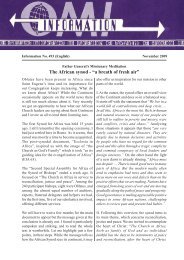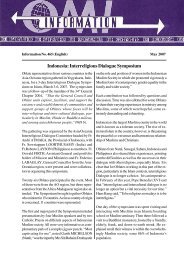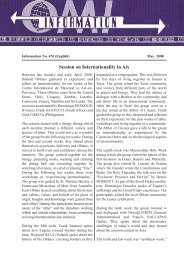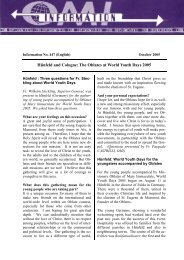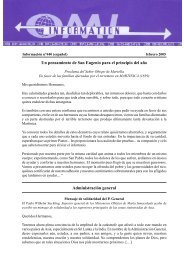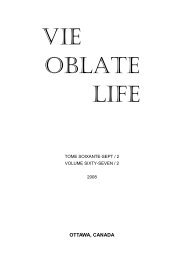July 2007 - Missionary Oblates of Mary Immaculate Communications
July 2007 - Missionary Oblates of Mary Immaculate Communications
July 2007 - Missionary Oblates of Mary Immaculate Communications
You also want an ePaper? Increase the reach of your titles
YUMPU automatically turns print PDFs into web optimized ePapers that Google loves.
<strong>July</strong> <strong>2007</strong> 467/1Information No. 467 (English) <strong>July</strong> <strong>2007</strong>Ukraine: Remembering an Oblate martyrThe Oblate priests and brothers <strong>of</strong> the Delegation<strong>of</strong> Ukraine met from May 15-19 in Obukhiv, nearKiev, to reflect on their ministry in that country. Thefocus <strong>of</strong> their reflection and discussion was prayerin the life <strong>of</strong> the missionary, as well as how to bringthe message <strong>of</strong> Jesus to a people <strong>of</strong> whom, accordingto statistics, 54% do not identify with any religion.The <strong>Oblates</strong> minister in about 20 parishes in Ukraine.The session began with prayer and with a conferenceby Don Jan Sikorsi, the spiritual director <strong>of</strong> the majorseminary <strong>of</strong> Kiev. His topic was: “What is the mostimportant thing for the missionary?”May 17 was an especially important day for the<strong>Oblates</strong>. They traveled some 400 km from Kiev tothe parish church <strong>of</strong> Rokytne. There, together withnumerous parishioners, they celebrated a solemnMass on the occasion <strong>of</strong> the 100 th anniversary <strong>of</strong>the birth <strong>of</strong> Servant <strong>of</strong> God LudwikWRODARCZYK, martyred in 1943 at Okopybecause he refused to let the church be destroyedby Ukrainian nationalists. They cut him with a saw,and because he was still alive, they tied him to a treeand shot him. Devotion to this Oblate priest is stillvery much alive in the hearts <strong>of</strong> the faithful.Therefore, after the Mass, the <strong>Oblates</strong> went to theplace where Fr. Wrodarczyk died. Today there is afield where, before the war, there was the churchand the village <strong>of</strong> Okopy. Today, all that remains isa cemetery where the <strong>Oblates</strong> erected a cross withthe inscription: “On the occasion <strong>of</strong> the 100 thanniversary <strong>of</strong> the birth <strong>of</strong> Fr. Ludwik Wrodarczyk(Continued, p. 2)Rome: Fr. Phillip Pöllitzer named bishop in NamibiaOn May 31, His Holiness, Pope Benedict XVI named Fr. Phillip PÖLLITZER as bishop <strong>of</strong> theDiocese <strong>of</strong> Keetmanshoop in Namibia.Until January <strong>2007</strong>, he was the provincial <strong>of</strong> the Province <strong>of</strong> Namibia. Born in Mörtelsdorf in theArchdiocese <strong>of</strong> Salzburg, Austria, in 1940, he completed his Oblate formation in Hünfeld, Germany,where he was ordained a priest in 1965.His first obedience was to Namibia where he exercised pastoral ministry in the eastern part <strong>of</strong> theArchdiocese <strong>of</strong> Windhoek. He has also been responsible for the formation <strong>of</strong> permanent deacons inthat archdiocese and was pr<strong>of</strong>essor at the Interdiocesan Seminary <strong>of</strong> St. Charles Lwanga in Windhoek.The Diocese <strong>of</strong> Keetmanshoop covers over 264,000 square kilometers in the southern part <strong>of</strong>Namibia. According to the diocesan web site, there are about 38,000 Catholics in 21 parishes(27.9% <strong>of</strong> the population). Other statistics include: two diocesan priests and 18 religious priests;18 permanent deacons; 23 men religious and 49 women religious. All <strong>of</strong> the previous bishopswere <strong>Oblates</strong> <strong>of</strong> St. Francis de Sales.
467/2 <strong>July</strong> <strong>2007</strong>OMI (1907-1943), who died here a martyr’s death,remaining faithful to his vocation to the end.17.05.<strong>2007</strong>. <strong>Oblates</strong> <strong>of</strong> <strong>Mary</strong> <strong>Immaculate</strong>.”Perhaps it is thanks to Fr. Ludwik that the OblateCongregation is working and developing in Ukraine.Fr. Ludwik was the only priest who stayed in Volinia;during the war he did not go back to Poland. Hedid not hide, but he zealously continued to preachGod’s word, not only in Okopy, but all the way toZhytomyr and Kiev, where for many years peoplehad been waiting for a priest to baptize them andgive them Holy Communion. His friend, Don AntoniChomicki from Murafa remembers him: “I loved thatpriest so much. He was so modest and humble. Itwas as if something was speaking through him. Iwas amazed that everyone wanted to go toconfession to him. They went to him because theysensed his holiness. Whenever he preached aretreat, some sort <strong>of</strong> holiness, some sort <strong>of</strong> forcespoke through him.”As they placed the cross in the place where thechurch and the village once stood, the <strong>Oblates</strong>prayed for the strength to persevere in their ownvocation, and to be able to preach the word <strong>of</strong> Godin today’s world.The last day <strong>of</strong> the Oblate gathering at Obukhiv wasunder the guidance <strong>of</strong> Bishop Jan Niemie, Auxiliary <strong>of</strong>the Diocese <strong>of</strong> Kamyanets-Podilskyi. In his conference,he emphasized the importance <strong>of</strong> one’s personal witnessin preaching the Gospel to the people: “Each <strong>of</strong> us mustpass on to others our own experience <strong>of</strong> the life <strong>of</strong>Jesus Christ. In order to be able to do that, we need tomeet Christ in our own lives. The people <strong>of</strong> Ukrainesuffers much because they do not know Jesus Christ…”(Pavlo VYSHKOVSKYY)General AdministrationGENERAL HOUSEFarewell and welcomeAs always happens at this time <strong>of</strong> the year at theGeneral House, there are departures and arrivals,not only <strong>of</strong> guests, but also <strong>of</strong> members <strong>of</strong> thecommunity. Some leave for holidays; some departfor new ministries in their home Units. Everyindividual member <strong>of</strong> a community leaves some sort<strong>of</strong> imprint on the whole group. Therefore, arrivalsand departures necessarily bring changes andadjustments to the “chemistry” <strong>of</strong> the community.The biggest change this year is the new communityleadership. On June 16, Gilberto PIÑON wasinstalled as superior <strong>of</strong> the General House,replacing Jean-Pierre CALOZ. Also installedwere the members <strong>of</strong> the new house council,James ALLEN, Mauro CONCARDI, EricALLEAUME, and Wedner BERARD. Jean-Pierre has returned to the Province <strong>of</strong> Francewhere he will be on the formation team at thescholasticate in Lyon.Francisco PUERTA (Venezuela), and PeterRAJANAYAGAM (Jaffna). In the spring, JeromeVELICHOR completed his licentiate and will soonreturn to Jaffna. Also returning to his province afterthree years on the maintenance crew at the GeneralHouse was Bro. Tony SZKLARSKI (United States).With its many ecclesiastical universities, Romeattracts <strong>Oblates</strong> from all over the world for higherstudies (licentiates and doctorates). Coming to Romein <strong>2007</strong> to either begin or complete higher degreesare the following: Ajith WELLINGTON (Colombo),Alan HENRIQUES (Natal), Paul MANESSA(Congo), Arun ROZARIO (Bangladesh), andAdimai Vincent SULIVAI (India).Several <strong>Oblates</strong> already returned to their home Unitswhen they finished their studies in the early part <strong>of</strong><strong>2007</strong>: Gnanapragasam ATPUTHARAJA (Jaffna),
<strong>July</strong> <strong>2007</strong> 467/3EuropeANGLO-IRISH PROVINCEDeath <strong>of</strong> former Procurator GeneralFormer Procurator General, Fr. Michael O’REILLYdied peacefully in his sleep on June 10, <strong>2007</strong>, at theOblate residence in Inchicore a few months prior tohis 90 th birthday. He served in the GeneralAdministration during the terms <strong>of</strong> four SuperiorsGeneral (Léo DESCHATELÊTS, RichardHANLEY, Fernand JETTÉ, and Marcello ZAGO).The Dublin native made his first pr<strong>of</strong>ession <strong>of</strong> vows in1935. After his ordination in 1941, he taught CanonLaw at the Piltown scholasticate before going to Rome’sGregorian University where he earned a doctorate“summa cum laude,” with a dissertation entitled “Deinjusta censura ejusque obligatione.” Havingreturned to Ireland to continue his teaching ministry, hewas also superior at Piltown from 1958 until 1964.From 1966 until 1987, he was the Congregation’schief legal advisor and our representative to the HolySee. After the General Chapter <strong>of</strong> 1974 a specialCommittee was established to prepare a new text<strong>of</strong> the Oblate Constitutions and Rules. Michael wasa very active member <strong>of</strong> that Committee whichcontinued its work throughout the following yearsuntil the definitive text was published in 1982.Those were difficult years, the era <strong>of</strong> post-VaticanII. Many members <strong>of</strong> the Congregation left thereligious life and the priesthood and it was Michael’stask to present each request for laicization to theVatican. Some <strong>of</strong> them had been his students in theirearlier years and he was saddened by their situationbut he never let that get him down. Whatever thecomplications, he presented each case with meticulouscare and almost always succeeded in having theirsituation regularized in the eyes <strong>of</strong> the Church.Known at the Holy See as a canonist with a kindand gentle heart, he was named a Consultor to theSacred Congregation for Religious and theCongregation for the Clergy. On top <strong>of</strong> all his otherduties, he taught Canon Law at the Pontifical BedaCollege. From 1982 until 1988, he was superior <strong>of</strong>the General House community.Michael’s knowledge <strong>of</strong> Canon Law and his abilityto put that law at the service <strong>of</strong> persons, rather thanthe other way around, was legendary. In the various<strong>of</strong>fices he has exercised, he was consulted by<strong>Oblates</strong> and Church authorities in all five continents.Even while serving as Procurator General, he began,in 1975, to be a summertime visiting pr<strong>of</strong>essor <strong>of</strong>Canon Law at St. Paul University, Ottawa. Whenhe left Rome in 1988, he took up residence inOttawa and continued his teaching and consultinguntil he “retired” to Ireland in 1994. Until his healthcalled for full retirement in <strong>July</strong> 2006, he worked forthe Dublin Regional Marriage Tribunal, having beenappointed judge in 1997. (Thanks to NedCAROLAN for supplying some information.)FRANCEA living memory <strong>of</strong> Fr. AlbiniMay 20 th was the 168 th anniversary <strong>of</strong> the death <strong>of</strong>Father ALBINI. It was not a special anniversary; butthere is special enthusiasm for its annual celebration inVico (Corsica) where he gave back his soul to Godand where his mortal remains are buried.A large gathering <strong>of</strong> faithful and pilgrims, coming fromVico and the parishes <strong>of</strong> the “Pieve de Sorru” (region<strong>of</strong> Vico), found its way to the Convent <strong>of</strong> SaintFrancis, the final destination <strong>of</strong> their pilgrimage.Some came from overseas, such as the group ledby Fr. Noel LECA, a native <strong>of</strong> Vico, and Fr.Bernardi, rector <strong>of</strong> the Basilica <strong>of</strong> St-Michel deMenton where Charles Dominique Albini was bornand was baptized. Even there on the continent, thememory <strong>of</strong> and devotion to Fr. Albini are alive.This year, besides the Provincial <strong>of</strong> France, Fr.Bernard DULLIER, Fr. Joaquín MARTÍNEZ waspresent in his role as Postulator General for OblateCauses. At Mass, the church was filled with thefaithful. The Eucharist was concelebrated by some15 priests, assisted by a permanent deacon. At theend <strong>of</strong> the homily, the Postulator General challengedthe assembly: “Do you really want Fr. Albini tobe <strong>of</strong>ficially recognized as a saint?” A thunderousYES rang out in the church. He invited them tocollaborate with the Cause, praying for graces and
467/6 <strong>July</strong> <strong>2007</strong>Even though the term “Honorary Oblate” seems tobe <strong>of</strong> more recent vintage, the practice <strong>of</strong> grantingparticipation in the prayers and merits <strong>of</strong> the <strong>Oblates</strong>goes back to the time <strong>of</strong> the Founder. There is aformal document related to this dated September25, 1842, in which Bishop de Mazenod grants thisparticipation to Mr. and Mrs. Olivier Berthelet <strong>of</strong>Montreal. These friends <strong>of</strong> Fr. Léonard BAVEUXhad given their property in Longueuil to the <strong>Oblates</strong>.In recognition <strong>of</strong> this, Fr. HONORAT asked Bishopde Mazenod, on August 13, to write a letter grantingthis share in the privileges and merits <strong>of</strong> the <strong>Oblates</strong>.Subsequently, General Chapters authorized thismanner <strong>of</strong> showing our recognition <strong>of</strong> benefactorsand distinguished collaborators. The Chapter <strong>of</strong>1947 speaks <strong>of</strong> “<strong>Oblates</strong> <strong>of</strong> Honor” and recalls thatit is up to the Superior General to grant this title “ashas been done up to now.” The Chapter <strong>of</strong> 1959mentions the same directive.Since the beginning <strong>of</strong> the Congregation, there havebeen more than 500 Honorary <strong>Oblates</strong>. At theGeneral Archives, there is a registry with the names<strong>of</strong> 172 persons, between 1911 and 1961.Africa-MadagascarLESOTHOAnniversary <strong>of</strong> Pius XII Catholic CommunityDuring the whole month <strong>of</strong> April this year, Pius XIICatholic Community on the campus <strong>of</strong> the NationalUniversity <strong>of</strong> Lesotho was commemorating the 62 years<strong>of</strong> its existence, starting from the founding <strong>of</strong> Pius XIICatholic University College, on April 8, 1945.The idea <strong>of</strong> establishing a Catholic University in Africawas conceived by the hierarchy <strong>of</strong> the SouthernAfrican Catholic Bishops in 1938, at the synodmeeting held in Cape Town. This dream was notrealized until 1945 when Bishop Cyprian JosephBONHOMME, then bishop <strong>of</strong> Lesotho, acceptedto build a University between Roma Parish andformer St. Theresa Minor Seminary.In 1946, the new site to build a Catholic Universitywas granted by the Queen Regent Amelia ‘MantšeboSeeiso who allocated the site where NUL is foundtoday. In 1950, the Catholic University College wasentrusted <strong>of</strong>ficially to the Congregation <strong>of</strong> the<strong>Missionary</strong> <strong>Oblates</strong> <strong>of</strong> <strong>Mary</strong> <strong>Immaculate</strong>. The batonfell on Fr. Paul-Emile BEAULE, who became thefirst rector (1945-1950).The celebration <strong>of</strong> the 62 nd anniversary <strong>of</strong> PiusXII Catholic Community marks another milestonein the life <strong>of</strong> the Catholic Community in thecampus. The raison d’être <strong>of</strong> the CatholicCommunity is to continue, promote and developfurther the ideals for which the Catholic UniversityCollege was founded.The founding Fathers <strong>of</strong> Pius XII C.U.C. were armedwith clear vision and firm commitment to found aninstitution <strong>of</strong> higher learning, based on Christianprinciples <strong>of</strong> altruistic love and dedicated service toone another, guided by unreserved search for truthin its many facets.As the Catholic community on campus we walk tall,not because we stand on firm ground, but becausewe stand on the shoulders <strong>of</strong> the giants <strong>of</strong> faith, andvisionaries. We stand in the middle <strong>of</strong> the trinity <strong>of</strong>time: Past, Present and Future. We are looking atthe Past with gratitude; at the Future with hope; andat the Present with enthusiasm. We are part <strong>of</strong> theevolving process <strong>of</strong> building a sustainable Future.”(Fr. Tlali G. LEROTHOLI – Roma).NATALBuilding unity in the provinceSouth Africa is a multicultural nation emergingfrom years <strong>of</strong> discrimination and division in whichracial stereotypes and attitudes almost destroyedthe country. We <strong>Oblates</strong> have also been affectedby the negative and sinful dimensions <strong>of</strong> thesociety. This mainly happened to us long beforewe entered the Congregation in our primarysocialisation as children. The province identifiedthe need to heal ourselves from these wounds asone <strong>of</strong> the main priorities. At the 2006 provincecongress, the following resolution was made:Congress 2006 calls local Superiors to provideopportunities for community and teambuilding,and workshops that cultivate effective
<strong>July</strong> <strong>2007</strong> 467/7communication and integration <strong>of</strong> culturaldiversity in community.The first step taken to begin this process was aworkshop on cultural diversity held in the variouslocal communities <strong>of</strong> the province. During the firsthalf <strong>of</strong> <strong>2007</strong>, Father Noel PETERS conducted thisseven hour workshop in five different communities<strong>of</strong> the province: the three districts; the scholastics intheology at Cedara, and finally the Oblate formatorstogether with the Oblate lecturers at St. Joseph’sTheological Institute.The workshops have been an overwhelming success.Here are just a few <strong>of</strong> the comments received:*It was a healthy forum to voice our inner feelings,without feeling guilty.*It was a tremendous way <strong>of</strong> healing past hurts*It challenged my own stereotypes.*I was reluctant to spend a whole day on this, butby the end <strong>of</strong> the day, I was reluctant to leave.*We are all different and that needs to be respected.It brings about the question <strong>of</strong> freedom in the person.The motto <strong>of</strong> South Africa, written in the Khoisanlanguage, literally means “Diverse people unite.” Itaddresses each individual effort to harness the unitybetween thought and action. On a collective scale itcalls for the nation to unite in a common sense <strong>of</strong>belonging and national pride - unity in diversity.It is clear that with the first cultural diversityworkshop, we have begun exploring a matter that isvital to our future as a province in this country. Theconsensus was that more time is required to go moredeeply into this matter. (Stuart BATE)NORTHERN SOUTH AFRICAJohannesburg becomes an archdioceseArchbishop Buti TLHAGALE now has not only thetitle <strong>of</strong> “archbishop” but he is now a “MetropolitanArchbishop.” On June 5, Pope Benedict XVIerected the ecclesiastical province <strong>of</strong> Johannesburg(South Africa) and named him its first MetropolitanArchbishop, with the suffragan Sees <strong>of</strong> Manzini(Swaziland), Klerksdorp, and Witbank.The archbishop had already served as a MetropolitanArchbishop while he was in charge <strong>of</strong> theArchdiocese <strong>of</strong> Bloemfontein (1999-2003), nowbeing served by Archbishop Jabulani NXUMALO.When he moved to Johannesburg, he retained“archbishop” as a personal title.Since it became the Apostolic Vicariate <strong>of</strong> Transvaalin 1904, what is now the Archdiocese <strong>of</strong>Johannesburg has had eight Ordinaries, six <strong>of</strong> whomwere <strong>Oblates</strong> <strong>of</strong> <strong>Mary</strong> <strong>Immaculate</strong>.CHADWar, AIDS, and prison in PalaBrother Hervé GIVELET was in Cameroon for50 years. Now he is Pala, Chad. Here is what hesees around him.In spite <strong>of</strong> the rumors <strong>of</strong> war near the border withSudan to the East, here the situation is relatively calm.Recently, the rebels were able to arrive with noresistance all the way to N’Djaména, the capital.Some violent battles took place all morning just 500meters from our Oblate parish. But it was a briefattack: the rebels were wiped out. They tell <strong>of</strong> 500dead: soldiers and civilians. It seems that the Frenchgreatly contributed to the victory <strong>of</strong> President IdrisDeby; this has aroused the anger <strong>of</strong> a good part <strong>of</strong>the population which is anti-government. It’s true:the role <strong>of</strong> the French is very ambiguous.As far as AIDS is concerned, there is news. Weare now able to treat our sick with antiretroviraldrugs. This medication does not cure but it doeshalt the progress <strong>of</strong> the disease. It causes greatfatigue and some cannot handle it. Once thetreatment is begun, one must not stop it, even for afew days: it’s a lifelong treatment. So that the familieswill take charge, we have them sign a commitmentto continue the treatment. We furnish it free to thepoorest ones, but where do you draw the linebetween some poor and the others? And what willhappen to the poorest when we are no longer here?At this point, we must especially keep in touch withour patients so that the adjustment happens with theleast amount <strong>of</strong> distress. Before, we werecompletely incapable <strong>of</strong> keeping them alive. Nowwe must keep them alive as long as possible: I mustadmit that I feel more comfortable in this role.
467/8 <strong>July</strong> <strong>2007</strong>It’s the prison that takes the greatest amount <strong>of</strong> mytime since I am alone to assure treatment andrespond to the different needs <strong>of</strong> the prisoners,especially regarding clothing. How do you tellsomeone that you love him if he is naked and sufferingif you do nothing to clothe him and heal him? Asimple bar <strong>of</strong> soap can bring joy to someone who isbathed in his own sweat and in the dust. I’m on mythird carton <strong>of</strong> 80 bars <strong>of</strong> soap…My work is especially a ministry <strong>of</strong> presence. Aprisoner is above all a person in distress. “We areno longer anything,” they tell me. “We are less thannothing: we no longer count for our neighbors.”The medicine I give the most is aspirin: “I have aheadache; I don’t sleep because I think too much.”Many <strong>of</strong> the prisoners say they have found or foundonce again their faith in prison. I have filled anotebook with their comments. That gives mecourage and hope. Isn’t the most important thingthat they feel they are loved? (Audacieux pourl’Évangile, May <strong>2007</strong>)Asia-OceaniaCOLOMBOProvince to renew all ministries with OblatecharismThe Provincial and Council <strong>of</strong> the Colombo province,at a recent meeting, reflected together on how tobest deepen the understanding <strong>of</strong> the province’sministries in the light <strong>of</strong> our charism and our corevalues so as to live them creatively.The provincial, Fr. Clement WAIDYASEKARA,will bring together <strong>Oblates</strong> engaged in differentministries for one and two-day meetings so that,through joint reflection, they might evaluate anddeepen their commitment to Oblate values withintheir own particular ministries.Those in preaching ministry will consider waysto become more prophetic in preaching God’sreign, including the ecological, human, social andpersonal dimensions.<strong>Oblates</strong> in parish ministry will reflect on the quality<strong>of</strong> their sacramental ministry and on ways to promotekingdom ministries in the parishes.Those in the children’s apostolate will focus onvalue education and formation, character formation,psychosexual development, development <strong>of</strong> talentsand skills, interreligious formation, and on theprotection <strong>of</strong> children’s rights and dignity.Several centers involved in youth ministry willbe requested to promote self-esteem, psychosexual-spiritualintegration, social leadership, andcounseling programs.A number <strong>of</strong> <strong>Oblates</strong> serve as hospital chaplainsand as psychological counselors. They will beasked to organize themselves so as to bettercoordinate their special ministry. They will be askedto improve their administration <strong>of</strong> the sacrament <strong>of</strong>reconciliation and their care <strong>of</strong> the sick and prisoners.They should also consider the rights <strong>of</strong> patients andgive guidance to healthcare workers.<strong>Oblates</strong> engaged in formation and vocationministries will try to make the programs morepastoral and more missionary. They will alsoconcentrate on formation for transformation, ongoingformation and renewal programs.Empowering the lay faithful through collaborativeleadership will be a topic for <strong>Oblates</strong> working inparishes, in Oblate Centers and in formation houses.This will include discussions about Justice, Peaceand the Integrity <strong>of</strong> Creation, as well as the use <strong>of</strong>the media.In the area <strong>of</strong> finances, the provincial treasurer, localtreasurers, and the finance committee <strong>of</strong> the provincewill invite other competent persons to discuss with themmatters pertaining to financial self-reliance andaccountability. They will also stress simplicity <strong>of</strong> lifestyle.The province has a proud history <strong>of</strong> sendingmissionaries beyond Sri Lanka. The provinceleaders will emphasize the need for strategic planning
<strong>July</strong> <strong>2007</strong> 467/9for proactive and collaborative leadership with theOblate delegations attached to the province as wellas with the Oblate province <strong>of</strong> Jaffna. (Fr. W.Emmanuel FERNANDO)PHILIPPINESA new mission station is bornThere are only a few Christians in Tawi-Tawi so whyopen a new mission station there? But last December12, 2006, Bishop Angelito “Lito” R. LAMPON,the Vicar Apostolic <strong>of</strong> Jolo, did just that.This is how it all started. In the summer <strong>of</strong> 2005, acouple from came to Bongao parish for to arrangetheir marriage. They said they came from SitioUngusan, Kualabaro, Languyan, Tawi-Tawi.Located on mainland Tawi-Tawi, it is an eight-hourtrip to Bongao by lansa (big wooden passenger boat)-- one can go there only by boat. They said thatthere are many other Christians in that place. Theycome from the different provinces <strong>of</strong> Zamboangadel Sur and Norte, Davao and Sibugay, the cities <strong>of</strong>Dumaguete and Pagadian, and elsewhere. One familyeven comes from M’lang, Cotabato, the belovedhometown <strong>of</strong> Bishop Lito.When they first came, most <strong>of</strong> them worked for alogging company owned by the Matba family. Whenthe logging company stopped operations, they choseto remain there because they were already in the“greener pasture.” Besides, it was a peaceful placeand full <strong>of</strong> promise.Fr. Rito “Dodoy” DAQUIPIL, parish priest <strong>of</strong> HolyRosary Parish in Bongao, was fascinated by thenews. Without much delay he requested Sister BettySimbajon, DC, the former leader <strong>of</strong> the BasicEcclesial Community Ministry <strong>of</strong> the Vicariate, toinvestigate the place. She commissioned one <strong>of</strong> herstaff, Mr. Roger Rivera, to visit the area.After four days he came back with the neededinformation. There are 72 Christian families livingthere. That is more than all the Christian families <strong>of</strong>Tongehat, Sibutu and Halu Sugbo combined. Some<strong>of</strong> the families are farmers. They produce panggi(ground cassava) and rice without commercialfertilizers. Because there are still many monkeys andwild pigs roaming around the area, they stoppedplanting corn and other crops. Others are fishermenor are engaged in illegal logging. Many have beenthere for 25 to 30 years.Bishop Lito was then informed about this newdiscovery. With his preliminary approval, a plan wasdevised to learn more about the area. Sister Bettyand her staff then went to Sitio Ungusan to gathermore data. From August to December, they wentback and forth to the area. They conductedcatechism instructions, organized the families, andinvited the people to receive the sacraments. Fr.Dodoy also went there a few times.On December 8, 2005, on the feast <strong>of</strong> the<strong>Immaculate</strong> Conception, the first Eucharist wascelebrated there by Fr. Dodoy. It was then thatthe people decided that Our Lady <strong>of</strong> the<strong>Immaculate</strong> Conception would be their patroness.On February 14, 2006 Fr. Dodoy had a groupwedding during which both young and old coupleswere married.Shortly thereafter, the construction <strong>of</strong> the smallmission house was begun. Bishop Lito gaveenough money for its construction. He also helpedin building the chapel. It took over a year toprepare the people and set up the mission station.The bishop then scheduled the fiesta Mass onDecember 12, 2006, because he had be at theSiasi Mission on December 8 to celebrate itsfiesta; the patroness there is also the <strong>Immaculate</strong>Conception.Finally, the long-awaited moment came: thepeople would be celebrating their first fiesta!Children and adults were in their best clothingbecause they would be baptized and confirmed.The people were so excited and yet quite nervous.One could observe how they hungered for theword <strong>of</strong> God. For many years they had notreceived the sacraments. Now was the momentto be as one in celebrating the Holy Eucharist.Bishop Lito celebrated the first fiesta Mass inUngusan as scheduled. Fr. Dodoy and Iconcelebrated with the Bishop. A new missionstation was born! It certainly was a moment <strong>of</strong>grace. (Fr. Marcelo “Celoi” A. ANDAMON)
467/10 <strong>July</strong> <strong>2007</strong>Canada-United StatesCANADA-USAFirst gathering <strong>of</strong> young <strong>Oblates</strong>During the last week <strong>of</strong> May, a group <strong>of</strong> about 20young <strong>Oblates</strong> gathered at Deschatelêts Residencein Ottawa to celebrate the charism <strong>of</strong> St. Eugene.This event opened a new chapter in the region’shistory, as it was the first time that young <strong>Oblates</strong>from Canada and the United States met as a group.There was tremendous energy and enthusiasm in theyoung men who gathered, as stories about personalvocation and current ministry were shared. OneOblate, who presently serves with the NativeAmericans in the United States, mentioned how theLakota tribe accepted him as one <strong>of</strong> their own whenthey were able to tease him about his singing. Foranother Oblate, even getting to Ottawa was anadventure – his flight from Labrador City in remoteNorthern Canada was delayed for over a daybecause <strong>of</strong> a significant snowstorm – and this at theend <strong>of</strong> May!Nevertheless, the richness <strong>of</strong> the gathering was notlimited to sharing personal insights and traveladventures, since the conference organizers hadinvited two high-quality speakers to stimulate thethought processes <strong>of</strong> the young <strong>Oblates</strong>. Fr. RonYOUNG, a specialist in Missiology and a pr<strong>of</strong>essorat St. Paul University, Ottawa, wove the story <strong>of</strong>the early missions <strong>of</strong> the Congregation in such diverseplaces as Western Canada and Texas. Ronreminded the participants about the fire and passionthat drove the early missionaries. Our ancestors inthe charism <strong>of</strong> St. Eugene were intent on bringingJesus Christ’s salvation to the world. They realizedthat their ministry was to attract people to the fullness<strong>of</strong> life, both in this world and in the next.Fr. Warren BROWN, pr<strong>of</strong>essor Canon Law atOblate School <strong>of</strong> Theology, San Antonio, impressedupon the young <strong>Oblates</strong> the need for mentoringduring the early years <strong>of</strong> ministry, and mentionedsome specific steps the US Province is taking tomake this a reality. His thoughts on the early years<strong>of</strong> one’s missionary life sparked a candid discussionabout the challenges that young <strong>Oblates</strong> face in theirexperiences after perpetual vows or ordination.Daily Eucharist and prayers conducted in Englishand French, as well as some Spanish and Polishliturgical elements, reminded the men about theinternationality <strong>of</strong> the Congregation.The gathering ended on a Friday, and the <strong>Oblates</strong>who traveled from the four corners <strong>of</strong> Canada andthe United States to attend this event left for theirministries, renewed in fraternity and re-energizedin the charism <strong>of</strong> Eugene. In another two yearsthey will return to meet again, full <strong>of</strong> newexperiences and fresh challenges brought about byliving life – consecrated life – to the fullest.(Pawel RATAJCZAK)OMI LACOMBEOblate named President <strong>of</strong> St. Jerome UniversityThe Board <strong>of</strong> Governors <strong>of</strong> St. Jerome’s Universityhas appointed <strong>Missionary</strong> Oblate Fr. David PERRINas its next President, effective August 1, <strong>2007</strong>. Hisappointment is for a five-year term. St. Jerome’sUniversity was established by the Congregation <strong>of</strong> theResurrection in 1865 and became federated with theUniversity <strong>of</strong> Waterloo, Ontario, in 1960. It <strong>of</strong>fersprograms in liberal arts and mathematics.David is currently an Associate Pr<strong>of</strong>essor <strong>of</strong> Spiritualityand Ethics in the Faculty <strong>of</strong> Theology at Saint PaulUniversity in Ottawa, where he has also served as Dean<strong>of</strong> the Faculty. From 2002 to 2003, he was theProvincial <strong>of</strong> the St. Peter’s Province, chairing acommittee that oversaw the merger <strong>of</strong> five Oblateprovinces into one.After receiving an undergraduate degree in Chemistryfrom the University <strong>of</strong> Western Ontario, Perrin wenton to pursue studies in philosophy and theology, bothat the University <strong>of</strong> Ottawa and at St. Paul University.He received a Licentiate in Theology (S.T.L.), fromthe Pontifical Gregorian University in Rome. Hereceived his doctorate in theology from the University<strong>of</strong> Ottawa and Saint Paul University in 1995. His area<strong>of</strong> academic expertise is Christian spirituality.
<strong>July</strong> <strong>2007</strong> 467/11Latin AmericaCOLOMBIATrying to save the childrenThey are called “Gamines,” and they are considered“the disposable ones.” The term refers to thethousands <strong>of</strong> children who are living and dying in thesqualor <strong>of</strong> the streets in Bogota, Colombia. Everyday, new families arrive in Bogota; hungry, penniless,and hopeless. They are victims <strong>of</strong> a country plaguedwith war and extreme violence. These families wereforced to flee from the rural lands <strong>of</strong> their birth toavoid the incredible violence wrought by the drugwars. And yet, although they have escaped from theimmediate threat <strong>of</strong> the devastation in theirhometown, their chances <strong>of</strong> survival in the povertystricken slums <strong>of</strong> Bogota are bleak.It is in Bogota that these families disintegrate in theface <strong>of</strong> such tragic destitution. Many children areabandoned and those who are not orphaned are stillresponsible for finding their own food. Some <strong>of</strong> thesechildren survive by selling cigarettes, gum, and othertrinkets on the streets. Others are forced into drugtrafficking, prostitution, or begging. They live in thestreets; starving, desperate, and afraid.In 2001, the <strong>Missionary</strong> <strong>Oblates</strong> created a programto reach out to these poor children. Appropriatelynamed, The Foundation <strong>of</strong> Support for Childrenin Extreme Poverty began with just 12 streetchildren. “These youngsters were living in local parksand sleeping under bridges. The original program<strong>of</strong>fered a place for them to go during the day, get ahot meal, and prepared them to reenter the localschools,” explains Oblate Fr. Roger HALLEE, theProgram Director.The initial program was successful and was soonmoved to Ciudad Bolivar, a barrio situated on thesouthwest outskirts <strong>of</strong> Bogota, where nearly250,000 Colombians live in homes built on thehillsides. Fr. Roger continues, “Having the programin Ciudad Bolivar allowed us to be in the area withthe most need...the most recent arrivals are squattersliving in shacks in the ravines. The children <strong>of</strong> thesefamilies, uprooted from their original homes andschools, are those we find wandering in the streets<strong>of</strong> Bogota looking for handouts.”Today, the program is able to accept 140 childreneach year, ranging in age from 10-15. However,there are thousands <strong>of</strong> needy children. Each child isconsidered individually to determine which is themost in need. Because <strong>of</strong> budget limitations, theprogram can only accept one child per family. “It isa big decision on the part <strong>of</strong> the family to decide whowill be chosen to take part in the program. It issometimes heartbreaking to witness the sobbing mothersas they must choose one and leave the other three orfour to fend for themselves,” explains Fr. Roger.After the children are accepted into the program,efforts begin to inscribe them in the local schools.Twice a month, the program provides food to thefamily to help them in their immediate needs and limittheir time spent roaming the streets asking forhandouts. With the assistance <strong>of</strong> a social worker anda psychologist, the program also provides dailysocial programs outside <strong>of</strong> school hours to establishsocial skills and fortify family ties.The program is constantly growing and evolving toinclude more children and better integrate them intothe local society. With the voluntary assistance <strong>of</strong>young college students, the program now <strong>of</strong>ferssupervised studies, morning and afternoon groupactivities, special activities, and group therapy withparents. The children eat a hot meal at noon andhave refreshments during work sessions.The <strong>Oblates</strong> have had great success through theirministry with the children in the program. Thoseaccomplishments do not, however, change the sadfact that, for each child that is saved, there arethousands more children who are left to survive asbest they can on the merciless streets <strong>of</strong> Bogota.In Matthew 26:11, Jesus says, “The poor you willalways have with you...,” His words ring true forFr. Roger every day as he faces the numerouschildren in desperate need. Yet, for each childsaved, he remembers that he is helping to keepChrist alive in their hearts. (MAMI USA,<strong>Oblates</strong>, Summer <strong>2007</strong>)
467/12 <strong>July</strong> <strong>2007</strong>SURINAMEStill part <strong>of</strong> the Oblate familyIn Suriname, formerly known as Dutch Guiana,there is a small Oblate presence. Attached as a“district” to the Province <strong>of</strong> Belgium/Netherlands,a small number <strong>of</strong> <strong>Oblates</strong> continue their ministryamong the poor. Recently, the provincial <strong>of</strong>Belgium/Netherlands, Georges VERVUST, visitedthe district and wrote an account for the Bulletinde Liasion, Secteur Belgique-Sud. This is a smallpart <strong>of</strong> his travelogue.Finally we went to visit Rinus NIJSTEN (67 yearsold). He serves several parishes in the region <strong>of</strong>Billiton, just outside <strong>of</strong> Paramaribo. It’s the region<strong>of</strong> bauxite, the mineral in aluminum. Rinus doesgreat work in his own distinctive way.In one <strong>of</strong> the parishes, we met Armand Pinas. Heis the driving force behind a “second chanceschool” for adults who, for one reason or the other,did not finish primary school. This gives them theopportunity to catch up in their education and thushave greater chances in the job market. They canalso get a type <strong>of</strong> secondary education. The schoolfunctions with volunteers. Armand told us that thiswas his way <strong>of</strong> putting the gospel into practice.Actually, according to him, you can go pray andsing as much as you want in church, but if, in themeantime, you don’t do anything for your neighbor,you haven’t accomplished much at all! And headded: “I begin very early in the morning, working inmy little garden, because I have to make a living formy family, and then, from one or two in the afternoon,I am busy at school.”With the help <strong>of</strong> an organization, he has obtained fromthe authorities a bus for transportation to a biggerschool in a neighboring village. In his village, the schoolwas too small and many children could not followclasses. The bus now makes that possible: that’s howthey got to the root <strong>of</strong> school tardiness.In the same village, we visited Etto Fannel, one <strong>of</strong> theteachers. He was busy working in the garden withsome youngsters. “That’s the way they learn,” he said,“and that will be useful for them later on!” He showedus the vegetables he was growing. “If you were to gobuy all that in the city, it would cost much too muchmoney.” And when we left, we had to take with us abig piece <strong>of</strong> sugar cane and five or six freshly pickedcoconuts. Unfortunately, we had to leave them at thepresbytery in Fatima because we could not take themin our baggage. Etto also spoke <strong>of</strong> his wife who wasin the hospital and was to begin dialysis. One findshealth problems everywhere…In the Billiton parishes, Rinus and his people are goingto face some big changes: the Suralco bauxite mine isstripped bare and will be closed; they will go elsewhereto find their deposits. Many people will have to moveand it will be totally different.
<strong>July</strong> <strong>2007</strong> 467/13Anniversaries -- August <strong>2007</strong>75 Years <strong>of</strong> Religious Life1932.08.15 05338 Fr. Jan Geneja Poland70 Years <strong>of</strong> Religious Life1937.08.15 06613 Fr. Gaetano Nanni Australia1937.08.15 06605 Fr. John Peters Lacombe1937.08.15 06531 Fr. Remigio Salzillo Italy1937.08.15 06707 Fr. Clemente Trombetta Italy1937.08.29 07276 Bro. Charles Bédard Lacombe65 Years <strong>of</strong> Religious Life1942.08.02 07490 Fr. Léo Cantin Notre-Dame-du-Cap1942.08.02 07488 Fr. Jean-Claude Levesque Lesotho1942.08.02 07499 Fr. Gérard Montpetit Notre-Dame-du-Cap1942.08.02 07492 Fr. Romeo Murphy United States1942.08.02 07491 Fr. Jacques Rinfret Notre-Dame-du-Cap1942.08.15 07461 Fr. Kevin Cawte Northern S. A.1942.08.15 07463 Fr. Erberto Cerracchio Italy1942.08.15 07464 Fr. Renato Ciccone Italy1942.08.15 07508 Fr. Lawrence Conlon Lacombe1942.08.15 07505 Fr. Ephrem Pelletier Lacombe60 Years <strong>of</strong> Religious Life1947.08.02 08327 Fr. Adhemar Deveau United States1947.08.02 08331 Fr. Gustave Pelletier Notre-Dame-du-Cap1947.08.02 08334 Fr. Germain Ranger Notre-Dame-du-Cap1947.08.02 08337 Fr. Jean-Louis Richard Notre-Dame-du-Cap1947.08.15 08341 Fr. Laurent Alarie Lacombe1947.08.15 08829 Bro. Oscar Audet Notre-Dame-du-Cap1947.08.15 08280 Fr. Alessandro Costa Assumption1947.08.15 08340 Fr. Jean-Paul Demers Notre-Dame-du-Cap1947.08.15 08349 Fr. Dominique Kerbrat Lacombe1947.08.15 08344 Fr. Jean-Marie Lacasse Lacombe1947.08.15 08348 Fr. Albert Lafreniére Lacombe1947.08.15 08317 Fr. Pasquale Lanese United States1947.08.15 08316 Fr. Guerrino Peruzzi Italy1947.08.15 08338 Fr. Maurice Robitaille Notre-Dame-du-Cap50 Years <strong>of</strong> Religious Life1957.08.02 10319 Fr. Leo Guilmette Paraguay1957.08.02 10320 Fr. Roger Hallée Haiti1957.08.02 10318 Fr. John Louis Henault Haiti1957.08.15 10322 Fr. Jean-Eudes Boudreault Notre-Dame-du-Cap1957.08.15 10324 Fr. Edmond Brouillard Notre-Dame-du-Cap1957.08.15 10321 Fr. Chester J. Cappucci United States
467/14 <strong>July</strong> <strong>2007</strong>50 Years <strong>of</strong> Religious Life1957.08.15 10332 Fr. Gérard-François Cloutier Haiti1957.08.15 10278 Fr. Alexander Costa Colombo1957.08.15 10279 Fr. Widanalage Stanley de Mel Colombo1957.08.15 10328 Fr. Jacques Joly Lacombe1957.08.15 10284 Fr. Theogenes Joseph General Administration1957.08.15 10330 Fr. Leo Kertz Poland1957.08.15 10485 Fr. René Laberge Notre-Dame-du-Cap1957.08.15 10327 Fr. Claude Mayer Notre-Dame-du-Cap1957.08.15 10875 Bro. Peterosi Mokeki Lesotho1957.08.15 10874 Bro. Bernard Pauwels Belgium/Netherlands1957.08.15 10282 Fr. Dudley J. Perera Colombo1957.08.15 10323 Fr. VaughanQuinn Lacombe1957.08.15 10326 Fr. Lawrence Rosebaugh Mexico1957.08.15 10283 Fr. Philip Singarayar United States50 Years <strong>of</strong> Priesthood1957.08.06 09135 Fr. Victor A. Croos Central S. A.1957.08.06 09115 Fr. Hilarion Vethanayagam Jaffna25 Years <strong>of</strong> Religious Life1982.08.01 12717 Fr. John Cox United States1982.08.01 12716 Fr. Daniel Gagnon Mexico1982.08.01 12497 Bro. Charles Gilbert United States1982.08.15 12816 Bro. Jean-Marc Gauvreau Notre-Dame-du-CapOMI INFORMATION is an un<strong>of</strong>ficial publication<strong>of</strong> the General Administration <strong>of</strong> the <strong>Missionary</strong> <strong>Oblates</strong> <strong>of</strong> <strong>Mary</strong> <strong>Immaculate</strong>C.P. 9061, 00100 ROMA-AURELIA, ItalyFax: (39) 06 39 37 53 22 E-mail: information@omigen.orghttp://www.omiworld.orgEditing Team: James Allen (Director), Raúl Castro, Antonino BuccaPrinting: Rajapakse Francis RabindraCirculation: Théophile LePage
<strong>July</strong> <strong>2007</strong> 467/15Suffrages for our DeceasedNo. 44-53NAME PROV./Del. BORN DIED AT DATEFr. Matthew Hertz Lacombe 22/12/1923 Saskatoon 17/05/<strong>2007</strong>Fr. John Baptist Anandappa Colombo 29/07/1922 Kohuwela 18/05/<strong>2007</strong>Bro. Friedhelm Theisen Central Europe 15/08/1932 Hünfeld 22/05/<strong>2007</strong>Fr. Philippe Lemay Notre-Dame-du-Cap 13/02/1916 Richelieu 25/05/<strong>2007</strong>Bro. Jean Couronne France 22/06/1918 Pontmain 25/05/<strong>2007</strong>Fr. Yves Bertrais France 30/07/1921 Thouare sur Loire 27/05/<strong>2007</strong>Fr. Charles Deharvent Lacombe 04/03/1919 St. Albert 31/05/<strong>2007</strong>Fr. Russell Nickerson United States 22/09/1920 Tewksbury 05/06/<strong>2007</strong>Fr. Elphège Robin Notre-Dame-du-Cap 07/01/1916 Richelieu 06/06/<strong>2007</strong>Fr. Michael O’Reilly Anglo-Irish 17/12/1917 Inchicore 10/06/<strong>2007</strong>“We will keep alive the memory <strong>of</strong> our deceased and not fail to pray for them, faithfully<strong>of</strong>fering the suffrages prescribed on their behalf.” (const. 43)


